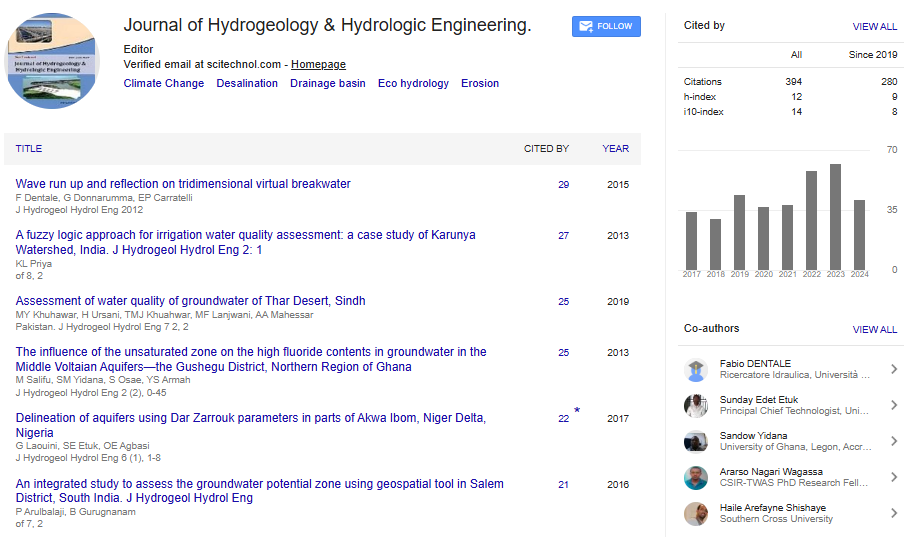Commentary, J Hydrogeol Hydrol Eng Vol: 13 Issue: 4
The Role of Ecohydrology in Sustaining Ecosystems and Water Resources
Luciano Mateos*
1Department of Civil Engineering, SRM Institute of Science and Technology, Tamil Nadu, India
*Corresponding Author: Luciano Mateos,
Department of Civil Engineering,
SRM Institute of Science and Technology, Tamil Nadu, India
E-mail: mateosl278@gmail.com
Received date: 29 July, 2024, Manuscript No. JHHE-24-149248;
Editor assigned date: 31 July, 2024, PreQC No. JHHE-24-149248 (PQ);
Reviewed date: 14 August, 2024, QC No. JHHE-24-149248;
Revised date: 21 August, 2024, Manuscript No. JHHE-24-149248 (R);
Published date: 29 August, 2024, DOI: 10.4172/2325-9647.1000336
Citation: Mateos L (2024) The Role of Ecohydrology in Sustaining Ecosystems and Water Resources. J Hydrogeol Hydrol Eng 13:4.1
Description
Ecohydrology is an interdisciplinary field that travels the dynamic interactions between water and ecosystems. By studying these relationships, ecohydrologists aim to understand how ecosystems affect the distribution, flow and quality of water and how water availability and management influence ecosystems. This growing field plays an essential role in solving contemporary environmental challenges, including water scarcity, ecosystem degradation and climate change.
These involve the movement, distribution and management of water resources. Understanding how precipitation, evaporation and groundwater flow affect ecosystems is essential in ecohydrology. Vegetation and organisms, such as plants and microbes, play a significant role in regulating the water cycle. Forests, for instance, can retain water and control runoff, impacting both water quality and quantity in nearby areas.
Healthy ecosystems provide essential services like water purification, flood regulation and groundwater recharge. Ecohydrology assesses these services to understand how ecosystem health impacts the surrounding hydrological environment. Ecohydrology also considers how human activities such as agriculture, urbanization and industrialization—affect water and ecosystem dynamics. By addressing these impacts, ecohydrologists can help devise sustainable water management strategies.
Water is a finite resource and its availability is under increasing stress due to population growth, climate change and human activities. Ecohydrology offers a framework to manage water resources more sustainably by recognizing the essential role ecosystems play in maintaining the water cycle.
Wetlands serve as natural buffers, absorbing excess water during heavy rains and releasing it slowly during dry periods. By restoring and maintaining these ecosystems, ecohydrologists can help moderate flood risks while enhancing biodiversity.
Healthy ecosystems, especially forests and wetlands, filter pollutants and improve water quality. For instance, riparian zones (the areas surrounding rivers and streams) help remove nitrogen and phosphorus from agricultural runoff, reducing the risk of eutrophication in nearby water bodies. Deforestation and land degradation often lead to reduced water retention and increased runoff, making regions more susceptible to droughts. Ecohydrological approaches emphasize the importance of maintaining vegetation cover and soil health to increase the flexibility of landscapes to water shortages.
Climate change is altering precipitation patterns, increasing the frequency and intensity of floods and droughts and affecting ecosystems worldwide. Ecohydrology provides valuable insights into how ecosystems respond to these changes and how they can be managed to adapt to new climatic realities.
For instance, increased temperatures and changing rainfall patterns can lead to shifts in vegetation and soil moisture. By understanding these changes, ecohydrologists can recommend strategies to protect vulnerable ecosystems and ensure the continued provision of precarious ecosystem services, such as carbon sequestration and water regulation.
Despite its potential, ecohydrology faces several challenges. The complexity of ecosystems and water systems makes it difficult to predict how changes in one aspect of the environment will affect the whole. Furthermore, integrating ecohydrological principles into mainstream water management practices requires collaboration across multiple disciplines, including biology, hydrology and engineering.
Moving forward, ecohydrology will play a pivotal role in addressing global environmental challenges, from safeguarding biodiversity to ensuring sustainable water supplies. By taking an integrated approach to water and ecosystem management, ecohydrology can help create a more stronger and balanced future for both nature and society.
Conclusion
Ecohydrology offers a complete approach to understanding the vital connections between water and ecosystems. By recognizing the intricate feedbacks between hydrological processes and ecological systems, ecohydrology provides essential insights for the sustainable management of water resources. As environmental pressures intensify, the importance of ecohydrology will continue to grow, helping guide efforts to protect ecosystems, enhance biodiversity and ensure the flexibility of water supplies in the face of climate change.
 Spanish
Spanish  Chinese
Chinese  Russian
Russian  German
German  French
French  Japanese
Japanese  Portuguese
Portuguese  Hindi
Hindi 
